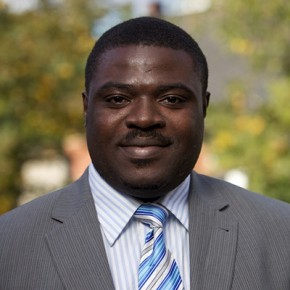
Damilola Olawuyi
Nigeria
- Program Year
- 2010-11
- Country of Current Residence
- Canada
- City/Town of Current Residence
- Waterloo
- Current Position
- Deputy Director and Head of International Environmental Law
- Organization
- Centre for International Governance Innovation (CIGI)
- Profession(s)
Lawyer, Environmentalist
- Sector(s)
- Climate Change, Climate Policy, Environment, Environmental policy, Governance, Law, Research
- Language(s)
- English
- Interest(s) / Expertise
- climate change, environmental law, environmental protection, governance, innovation, international law, sustainability
Damilola is committed to utilizing law to promote global sustainability, environmental protection and energy security. He is passionate about sustainable resource governance, proactive research, advocacy and traveling.
Damilola has an abiding interest in the role of law in environmental protection. His research explores the intersections between the environment and human rights under international law. Widely published, he is a sought-after speaker and consultant to several international organizations.
He obtained his LL.B degree from Igbinedion University, Okada, Nigeria graduating in First Class Honors; he then earned a BL degree from the Nigerian Law School, Abuja, graduating in another First Class Honors. He holds a Masters degree in law (LL.M) from the Harvard Law School, another LL.M from the University of Calgary and a Diploma in International Environmental Law from the United Nations Institute for Research and Training (UNITAR), Geneva, Switzerland. Damilola holds a doctoral degree in energy and environmental law from the University of Oxford.
Damilola has practiced law in Nigeria and is the author of several books and journal articles in the area of international environmental law. He has worked with the Environmental Law Program, UNITAR, and at Green Peace International, Washington, U.S.A. He currently works as a Consultant to several international organizations including the Youth Environmental Activists Network for Africa (YEANA), founded by Sauvé Fellow Idowu Ajibade (2008-09); the Development Law Associates in the USA; and the Environmental Lawyers Network. He is a member of the Legal Research Group of the Center for International Sustainable Development Law in Montreal. He has been a speaker at different high level international conferences on natural resources, energy and environmental law.
Further, Damilola is a member of several professional societies including the Commonwealth Lawyers Association (CLA), International Law Association (ILA), Canadian Lawyers for International Human Rights (CLAIHR), American Society of International Law (ASIL), Environmental Law Alliance Worldwide, West African Bar Association and the Nigerian Bar Association (NBA). He has received several national and international awards including the Sloane Robinson Award, the Alberta Law Foundation Scholarship, Harvard University Graduate Scholarship, and the Fellowship of the Canadian Institute of Resources Law.
Damilola was formerly an international energy lawyer at Norton Rose Fulbright Canada LLP, Calgary, Canada, where he served on the firm’s global committee on extractive resource investments in Africa. In 2016, he appointed as a Full Professor of International Law at Africa’s fastest growing university – Afe Babalola University – in his home country of Nigeria.
In June 2016, Damilola started working as Deputy Director and Head of International Environmental Law at the Centre for International Governance Innovation (CIGI) in Waterloo, with CIGI’s International Law Research Program (ILRP). In this role, he provides strategic guidance, operations coordination and management of CIGI’s international environmental law research and training programs.
Links:
- “Climate Change Impacts on Housing and Property Rights in Nigeria and Panama: Toward a Rights-based Approach to Adaptation and Mitigation” in Adaptation to Climate Change through Water Resources Management (2014)
- Routledge publishes Idowu Ajibade and Damilola Olawuyi
- The Human Rights-Based Approach to Carbon Finance (2016)
- Ontario’s Climate Change Action Plan: A Springboard to Meeting Canada’s Paris Goals (2016)
As a Sauvé Fellow, Damilola continued his doctoral research and began to examine more closely the impacts of environmental concerns like climate change on the enjoyment of human rights. He was particularly interested in how climate change is affecting Canada’s aboriginal peoples in Northern communities and hoped to conduct interviews with Inuit community members to establish how climate change has affected indigenous communities in Canada. He also tried to examine how the linkages between environmental concerns and human rights enjoyment can be better recognized under international law. Specifically, he considered how a human rights framework can be developed to balance the two paramount goals of international environmental law: the elimination of environmental harm or pollution which can affect natural habitats; and the elimination of environmental harm, discomfort or pollution which can affect human life.
